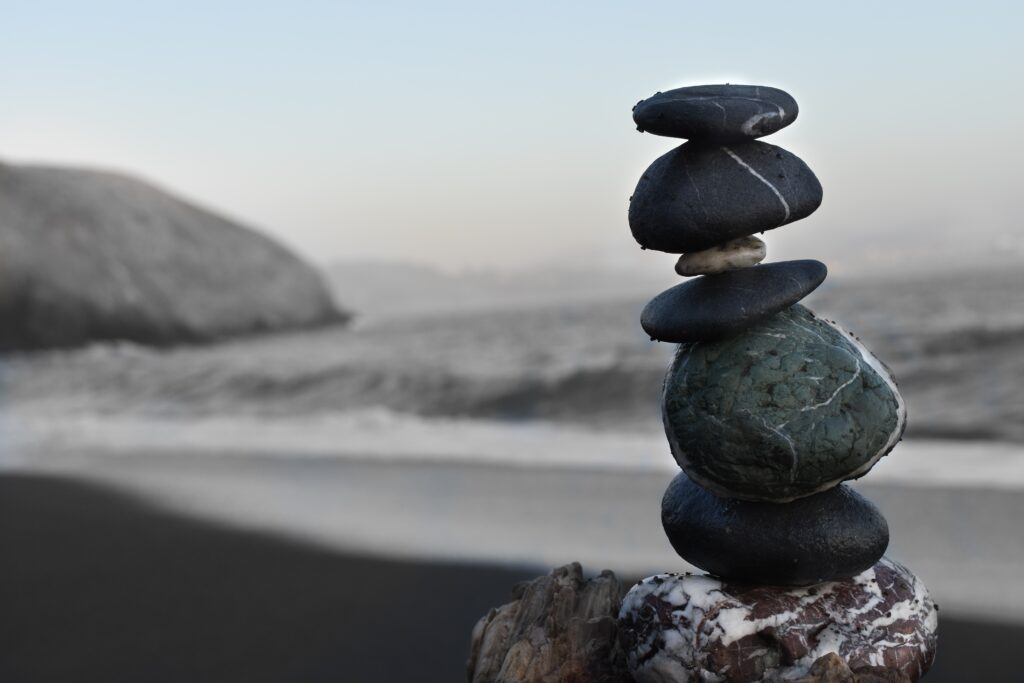Imagine a life where you have complete control over your emotions, thoughts, and actions. A life where stress takes a backseat, and you are able to navigate through challenges with ease and clarity. This is the incredible power that meditation and mindfulness can provide. By cultivating a daily practice, you are able to take charge of your life and transform it into one of tranquility, focus, and empowerment. In this article, we will explore the ways in which meditation and mindfulness can aid in taking charge and achieving a state of balance and well-being.
Increased Self-Awareness
Recognizing Thoughts and Emotions
Meditation and mindfulness practices help you to become more attuned to your thoughts and emotions. By sitting quietly and observing your mind, you gain a deeper understanding of your thought patterns and emotional responses. Through this self-awareness, you can start to recognize when negative thoughts or emotions arise, allowing you to respond more effectively and make conscious choices about how you want to think and feel.
Identifying Behavioral Patterns
Through regular meditation and mindfulness, you become more aware of your behavioral patterns. You start to notice recurring habits and tendencies that may have gone unnoticed before. By recognizing these patterns, you have the opportunity to make intentional changes and break free from unhealthy or unproductive behaviors. This increased self-awareness empowers you to take charge of your actions and make choices that align with your values and goals.
Understanding Triggers
Meditation and mindfulness provide a space for you to explore the triggers that lead to certain thoughts, emotions, or behaviors. By observing what arises within you during your practice, you can start to identify the specific triggers that may cause stress, anxiety, or anger in your everyday life. This understanding allows you to devise strategies to effectively manage or avoid these triggers, leading to a greater sense of control and well-being.
Developing Emotional Intelligence
Through meditation and mindfulness, you develop emotional intelligence, which refers to the ability to understand and manage both your own emotions and the emotions of others. By cultivating a non-judgmental and compassionate attitude towards your own thoughts and feelings during your practice, you become better equipped to show the same understanding and empathy towards others in your daily interactions. This enhanced emotional intelligence strengthens your relationships, improves communication, and allows you to take charge of your emotional well-being.
Improved Focus and Concentration
Reducing Mental Clutter
One of the major benefits of meditation and mindfulness is the ability to quiet the mind and reduce mental clutter. In today’s fast-paced world, we are often bombarded with countless thoughts and distractions, making it difficult to stay focused and concentrated on the task at hand. By regularly practicing meditation and mindfulness, you train your mind to let go of unnecessary thoughts and stay present in the moment. This mental clarity allows you to take charge of your attention and concentrate on what truly matters.
Enhancing Attention Span
Regular meditation and mindfulness exercises improve your attention span and focus. Through these practices, you strengthen your ability to direct your attention to a specific object or task and sustain it for longer periods of time. This enhanced attention span enables you to fully engage in activities, absorb information more effectively, and complete tasks more efficiently. By taking charge of your focus, you can achieve greater success in both your personal and professional endeavors.
Boosting Cognitive Abilities
Research has shown that meditation and mindfulness can have a positive impact on cognitive abilities such as memory, problem-solving, and decision-making. By quieting the mind and reducing stress, these practices optimize brain function and enhance cognitive performance. When your mind is clear and focused, you are better able to take charge of complex mental tasks, think critically, and come up with creative solutions to challenges.
Greater Mental Resilience
Meditation and mindfulness cultivate mental resilience, which refers to the ability to bounce back from setbacks, adapt to change, and maintain a positive mindset in challenging situations. By learning to observe your thoughts and emotions without judgment, you develop a greater sense of equanimity and inner strength. This resilience allows you to take charge of your mental well-being and stay calm, focused, and confident even in the face of adversity.

Stress Reduction
Calming the Mind and Body
Meditation and mindfulness techniques are powerful tools for reducing stress and promoting relaxation. By focusing on your breath and directing your attention to the present moment, you activate the body’s relaxation response. This activates the parasympathetic nervous system, which counteracts the body’s stress response and induces a state of calmness. By regularly practicing these techniques, you can take charge of your stress levels and experience greater peace and tranquility in your daily life.
Relaxing the Nervous System
Chronic stress can take a toll on the body’s nervous system, leading to a range of physical and emotional symptoms. Through meditation and mindfulness, you can activate the body’s natural relaxation mechanisms and promote the release of tension held within the nervous system. This relaxation response not only helps to reduce stress-related symptoms such as muscle tension and headaches but also allows you to take charge of your overall well-being and promote healing within the body.
Releasing Tension and Pressure
The practice of mindfulness involves bringing non-judgmental awareness to the body and its sensations. By consciously scanning the body and noticing areas of tension or discomfort, you can release physical and emotional stress held within the body. By taking charge of this process and actively releasing tension, you create space for relaxation and rejuvenation, allowing you to experience a greater sense of ease and well-being.
Managing Stressful Situations
Meditation and mindfulness empower you to navigate stressful situations with greater ease and resilience. By regularly practicing these techniques, you develop the ability to stay present and centered, even in the midst of chaos or pressure. This enables you to approach challenging situations from a place of calm and clarity, making it easier to make informed decisions and take charge of the outcome. By managing stress more effectively, you can maintain a sense of balance and well-being in your life.
Enhanced Decision-Making
Cultivating Observational Skills
Through the practice of meditation and mindfulness, you develop the ability to observe your thoughts, emotions, and sensations without attachment or judgment. This cultivates keen observational skills, allowing you to notice subtle details and patterns that may influence your decision-making process. By becoming an astute observer of your internal experiences, you can take charge of your decision-making and make choices that align with your values, goals, and true desires.
Mindful Evaluation of Options
Meditation and mindfulness provide a space for you to step back and objectively evaluate the options available to you. By practicing non-reactivity and non-attachment during your meditation sessions, you develop the capacity to approach decision-making with clarity and equanimity. This enables you to consider different perspectives and outcomes, carefully weighing the pros and cons of each option. By taking charge of this mindful evaluation process, you can make decisions that are informed, balanced, and in line with your highest good.
Reducing Impulsivity
Impulsive decision-making often leads to unfavorable outcomes and regrets. Meditation and mindfulness encourage you to pause and reflect before making decisions, allowing you to break free from impulsive tendencies. By cultivating a sense of inner stillness and clarity, you gain the ability to resist the urge to act on impulse and instead take charge of your choices. This increased self-control allows you to make decisions that are more deliberate, thoughtful, and aligned with your long-term goals.
Gaining Clarity and Perspective
Meditation and mindfulness practices help to quiet the mind and reduce mental clutter, creating space for clarity and insight. By regularly sitting in stillness and observing your thoughts, you gain a broader perspective and a deeper understanding of yourself and your circumstances. This expanded awareness allows you to take charge of your decision-making by considering the bigger picture, evaluating long-term consequences, and making choices that are aligned with your values and aspirations.

Increased Resilience
Developing Emotional Stability
Meditation and mindfulness cultivate emotional stability, which refers to the ability to maintain a sense of inner calm and balance regardless of external circumstances. By practicing mindfulness and observing your emotions without judgment, you develop the capacity to regulate your emotional responses effectively. This emotional stability allows you to take charge of your reactions and maintain a positive mindset, even in the face of adversity. By cultivating emotional stability, you can navigate life’s challenges with grace and resilience.
Building Mental Flexibility
By regularly practicing meditation and mindfulness, you develop mental flexibility, which refers to the ability to adapt and respond effectively to changing circumstances. These practices involve training the mind to let go of fixed ideas and preconceived notions, allowing for greater openness and receptivity. This mental flexibility enables you to take charge of unexpected situations and approach them with creativity and resourcefulness. By embracing change and staying flexible, you can navigate life’s challenges more effectively and achieve greater success and satisfaction.
Promoting Adaptive Coping Strategies
Daily life is filled with various stressors and challenges that can sometimes feel overwhelming. Through meditation and mindfulness, you develop adaptive coping strategies that allow you to effectively manage stress and navigate difficult situations. By cultivating a present-centered and non-judgmental attitude, you can take charge of your responses to stressful events and choose coping mechanisms that are healthy and beneficial. This ability to adapt and respond skillfully enhances your resilience and enables you to bounce back from setbacks with greater ease.
Embracing Change with Ease
Change is an inevitable part of life, and learning to embrace it with ease is essential for personal growth and well-being. Meditation and mindfulness practices provide a space for you to cultivate acceptance and non-attachment to the transient nature of life. By letting go of resistance and embracing change, you can take charge of your mindset and approach new experiences with curiosity and openness. This willingness to embrace change enhances your resilience, allowing you to adapt and thrive in the face of uncertainty.
Improved Communication
Enhancing Active Listening
Effective communication begins with active listening. Meditation and mindfulness practices teach you to be fully present and attentive in your interactions with others. By cultivating deep listening skills, you can take charge of your communication and truly understand others’ perspectives, needs, and desires. This enhanced ability to listen attentively fosters stronger connections, builds trust, and allows for more meaningful and effective communication.
Cultivating Empathy and Compassion
Meditation and mindfulness practices promote the cultivation of empathy and compassion towards oneself and others. By nurturing a sense of empathy, you can take charge of your communication by truly understanding and resonating with others’ emotions and experiences. This empathy fosters deeper connections and promotes kindness and understanding in your interactions. By practicing compassion, you can respond to others with kindness and support, fostering a positive and harmonious communication environment.
Reducing Reactivity in Conversations
Reacting impulsively or defensively in conversations can often lead to misunderstandings and conflict. Through meditation and mindfulness, you develop the capacity to pause and respond consciously rather than reacting unconsciously. By observing your thoughts, emotions, and bodily sensations during your practice, you cultivate self-awareness and self-regulation. This self-awareness allows you to take charge of your communication by responding thoughtfully and skillfully, fostering understanding and harmony in your interactions.
Improving Non-Verbal Communication
Non-verbal communication plays a crucial role in effective communication. Meditation and mindfulness practices cultivate body awareness and non-verbal sensitivity, allowing you to take charge of your non-verbal cues. By observing your bodily sensations and facial expressions during your practice, you become more attuned to the signals you are sending to others. This enhances your ability to convey your emotions and intentions accurately, promoting clearer and more authentic communication.

Better Time Management
Focusing on Priorities
In today’s fast-paced world, it is easy to get overwhelmed by the demands and distractions that compete for our time and attention. Meditation and mindfulness practices help you to take charge of your time by focusing on priorities. By regularly engaging in these practices, you develop the ability to stay present and centered, allowing you to identify your top priorities and allocate your time and energy accordingly. This enhanced focus on priorities enables you to make conscious choices, be more productive, and achieve a greater sense of fulfillment.
Minimizing Procrastination
Procrastination can hinder productivity and lead to increased stress levels. Meditation and mindfulness practices provide a space for you to observe and understand the underlying causes of procrastination. By developing self-awareness and recognizing the thoughts and emotions that lead to procrastination, you can take charge of your behavior and make intentional choices to overcome it. Through increased self-discipline and motivation, you can minimize procrastination and optimize your time management.
Enhancing Productivity
Regular meditation and mindfulness practices improve overall productivity by enhancing focus, concentration, and clarity of mind. By quieting the mental chatter and reducing distractions, you become more efficient and effective in completing tasks. This increased productivity allows you to take charge of your time and accomplish more with less effort. By harnessing the power of meditation and mindfulness, you can optimize your performance and achieve your goals with greater ease and satisfaction.
Creating Effective Routines
Meditation and mindfulness practices provide a foundation for creating effective routines that optimize your time management. By incorporating these practices into your daily life, you establish a sense of structure and consistency that promotes productivity and well-being. These routines enable you to take charge of your time by dedicating specific blocks for meditation and mindfulness, ensuring that you prioritize self-care and mental well-being. By establishing effective routines, you can create a balanced and fulfilling lifestyle.
Boosted Creativity
Silencing the Inner Critic
The practice of meditation and mindfulness helps to cultivate a state of non-judgmental awareness. By observing your thoughts without attachment or judgment, you can quiet the inner critic that often stifles creativity. By letting go of self-doubt and negative self-talk, you create a space for creative ideas to emerge and flourish. This ability to silence the inner critic allows you to take charge of your creativity and tap into your innate potential for innovative thinking and problem-solving.
Opening the Mind to New Ideas
Meditation and mindfulness practices expand your capacity for open-mindedness and curiosity. By approaching your thoughts and experiences with a beginner’s mind, you can take charge of your creative process and generate new ideas. This open-mindedness allows you to explore unconventional perspectives, embrace ambiguity, and break free from rigid thinking patterns. By opening your mind to new ideas, you can tap into fresh and creative insights that propel your personal and professional growth.
Stimulating Divergent Thinking
Divergent thinking is a key component of creativity, characterized by the ability to generate multiple ideas and solutions. Meditation and mindfulness practices enhance divergent thinking by fostering a state of relaxed focus and cognitive flexibility. By quieting the mind and reducing mental clutter, these practices create a fertile ground for unique and innovative ideas to emerge. This stimulated divergent thinking allows you to take charge of your creativity and approach challenges from fresh and unconventional angles.
Tapping into Intuitive Insights
Intuition can be a powerful tool for enhancing creativity. Meditation and mindfulness practices quiet the analytical mind and create space for intuitive insights to arise. By learning to trust and follow your intuition, you can take charge of your creative process and make decisions that feel aligned and inspired. This tapping into intuitive insights allows you to access the depths of your creative potential and channel it into your work and endeavors.

Improved Emotional Well-being
Regulating Emotions
Meditation and mindfulness practices provide a space for you to regulate and manage your emotions effectively. By cultivating non-reactivity and non-attachment to your thoughts and emotions during your practice, you develop the ability to respond skillfully to challenging emotions in your everyday life. This emotional regulation allows you to take charge of your well-being by recognizing and working through difficult emotions, fostering a greater sense of inner peace and emotional balance.
Increasing Positive Emotions
Regular meditation and mindfulness practices promote the cultivation of positive emotions such as gratitude, joy, and love. By training your mind to focus on positive aspects of your life, you can take charge of your emotional well-being and shift your perspective towards a more positive and optimistic outlook. This increased experience of positive emotions not only enhances your overall well-being but also improves your relationships, communication, and decision-making.
Developing Self-Compassion
Self-compassion is the ability to treat oneself with kindness, understanding, and acceptance, especially in times of difficulty or failure. Meditation and mindfulness practices cultivate self-compassion by teaching you to observe your thoughts and emotions with a non-judgmental and compassionate attitude. By developing self-compassion, you can take charge of your emotional well-being by offering yourself the same understanding and support you would give to a loved one. This self-compassion promotes resilience, self-acceptance, and a greater sense of inner peace and happiness.
Cultivating Happiness and Contentment
Meditation and mindfulness practices promote the cultivation of happiness and contentment by shifting your focus towards the present moment. By training your mind to be fully present and engaged, you can take charge of your emotional well-being and experience greater joy and fulfillment in your everyday life. This cultivation of happiness and contentment allows you to appreciate the simple pleasures, find beauty in the ordinary, and live with a greater sense of gratitude and satisfaction.
Increased Self-Discipline
Improved Impulse Control
Impulse control refers to the ability to resist immediate gratification and make choices that align with long-term goals. Meditation and mindfulness practices enhance impulse control by cultivating self-awareness and self-regulation. By observing your thoughts, emotions, and bodily sensations without judgment during your practice, you develop the capacity to notice impulses as they arise and consciously choose how to respond. This improved impulse control allows you to take charge of your behavior and make choices that support your long-term well-being and success.
Building Healthy Habits
Regular meditation and mindfulness practices provide a solid foundation for building healthy habits. By incorporating these practices into your daily routine, you establish a sense of structure and discipline that can extend to other areas of your life. This discipline allows you to take charge of your habits by consciously choosing behaviors that promote your physical, mental, and emotional well-being. By building healthy habits, you can create a solid foundation for personal growth, success, and overall life satisfaction.
Maintaining Consistency
Consistency is essential for achieving desired outcomes and personal growth. Meditation and mindfulness practices provide an opportunity for you to cultivate consistency by committing to a regular practice. By showing up consistently and dedicating time and effort to your practice, you develop self-discipline and take charge of your commitment to personal well-being. This commitment to consistency extends beyond your meditation practice and empowers you to stay focused and dedicated to other areas of your life as well.
Adding Structure to Life
Meditation and mindfulness practices add structure to your daily life, providing a sense of rhythm and routine. By incorporating these practices into your daily schedule, you create a framework that fosters discipline and organization. This structure allows you to take charge of your time and energy, ensuring that you dedicate sufficient time for self-care, personal growth, and reflection. By adding structure to your life, you create a supportive environment for achieving your goals and living a meaningful and fulfilling life.
In conclusion, meditation and mindfulness are powerful tools for taking charge of various aspects of your life. From increasing self-awareness and improving focus to reducing stress and enhancing decision-making, these practices offer a comprehensive approach to personal growth and well-being. By regularly engaging in meditation and mindfulness exercises, you can cultivate self-discipline, boost creativity, improve communication, and experience a greater sense of emotional balance and resilience. So why not start your journey to self-discovery and empowerment today?
